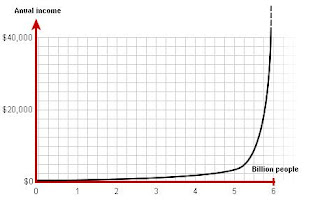
I own 10 pairs of shoes: black fancy, brown fancy, black casual, brown casual, new running shoes to run in, old running shoes to do housework in, two pairs of hiking boots, sandals, and flip-flops. My wife, who is by no means a clothes horse, has many more pairs than I do. My kids probably have three or four pairs each, only because their rapid growth makes buying more pairs pretty useless.
Add it all up, and maybe we're talking 30 to 40 pairs of shoes in our family of four. This is unfathomably rich, by the world's standards: the median number of pairs of shoes per person in the world is probably about one. That's right: if you have an extra pair of shoes, you are on the rich side of things.
According to this website, if you make more than $2.33 a day (an annual income of $850), that's enough to put you on the rich side of things. I am lucky enough to earn a salary well above that, one that puts our family easily in the top 15 percent of the world's population, which means there are well over 4 billion people in the world who make less than my family enjoys.
Spending is not evil. One can prudently buy a good pair of shoes, or a laptop computer, or a nice dinner out, and not feel that good money is being squandered. But, look at the chart above, and, considering where you fall on it, think about what fortune you have and what role you can play in improving the lot of those billions to the left of you.


3 comments:
This is a good thing to be reminded of, especially considering all of the valuable things we as Americans receive without directly paying anything at all, like protection from crime, that not everyone has access too.
I do have to admit to some trouble interpreting numbers like $2.33 a day. How does that fit into major variations in cost of living or the use of informal economies (is trading a goat for roof work counted toward income?)It's like those astronomy numbers measured in lightyears. Sounds huge, but it's hard to find that reference point to make sense of it.
I suppose the only real reference point is living it.
Daniel, thanks for chiming in. You are right that the $2.33/day is somewhat misleading, because a dollar goes a lot further in other countries. I suppose there's a way to convert monetary figures via purchasing power parity.
Re: things rich countries provide for free, that's also an excellent observation; in fact, there was a paper referenced in a recent Economist that suggested that even though it looks like income inequality is widening, the gap between the rich and poor isn't really getting bigger if you account for the vastly higher quality of life that is equally available to all people via medical advances, environmental improvements, marked improvements in the quality of really basic products like telephones and toasters, etc.
I've got some catching up to do... I'm just now reading this.
Anyway, I'm down with your subject, because I'm totally thinking about Acts 2:44-47 recently, and Zacchaeus, and Lazarus and The Rich Man, etc. I've got some ideas, and they more or less boil down to the good old "intentional community" thing. Live simpler, together, so that you can be more generous with those in need.
More to come.
Post a Comment